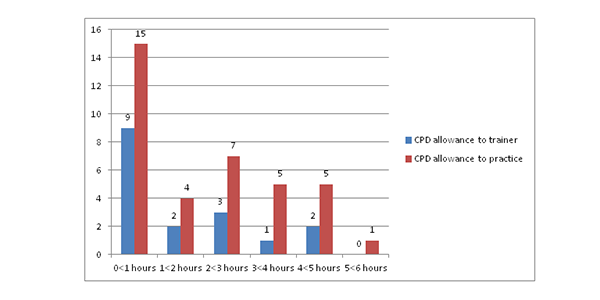 As a recently qualified GP trainer I have been aware of an “elephant in the room” regarding protected time for training. I have not been able to find any written advice regarding how much time a practice should make available to the trainer for supervision of surgeries; informal teaching, tutorial preparation, e-portfolio review, trainers’ group and training conference attendance. Informal comments from other trainers has lead me to believe that time is a significant problem for them. However, I have also gained the impression that they generally find training a very enjoyable and fulfilling role.
As a recently qualified GP trainer I have been aware of an “elephant in the room” regarding protected time for training. I have not been able to find any written advice regarding how much time a practice should make available to the trainer for supervision of surgeries; informal teaching, tutorial preparation, e-portfolio review, trainers’ group and training conference attendance. Informal comments from other trainers has lead me to believe that time is a significant problem for them. However, I have also gained the impression that they generally find training a very enjoyable and fulfilling role.
When I approached the Deanery I was advised that it is, “up to the individual trainer and practice to decide.” Although this is a reasonable comment, I feel that it would be useful to have a few facts on which to base a discussion.
I therefore wrote a short questionnaire which the Deanery kindly circulated to local trainers. The questions are listed below:-
How many WTE GPs are there in your practice?
Does the trainer or the practice receive the CPD grant?
Does the trainer or the practice receive the educational supervisor’s grant?
Do you have protected time to attend the trainers’ conference?
How much, if any, protected time do you have per year to attend the trainers’ group meetings?
Any comments?
I received 54 replies. The results are summarised below:-
Number of Respondents : Weekly Protected Hours
(Time off for trainers’ conference equates to 20 mins per week for a 46 week year. Time off for trainers’ meetings, assuming quarterly meetings equates to 10 mins off per week over a 46 week year. For those trainers having this time off, these values are added to their average weekly supervision time). Average protected time per week = 2-3 hours.
Of 19 comments, 14 indicated that they did not have enough protected time; 5 indicated that they were happy with the time which they were allocated.
Increasing protected time did not correlate with increasing feeling of satisfaction with time provision. Does this suggest that trainers may simply use all the time available, leaving other tasks such as e-portfolio review to their spare time? This may be a temptation if teaching is the part of the working day which we find most rewarding. Could it be that training fulfils in part the role of a hobby, with enjoyment and positive feedback providing adequate reward?
There are clearly many factors influencing time off, and these will vary between practices. The interest and enjoyment will also act as recompense to some extent. However, it seems reasonable to have enough protected time to maintain quality of training and prevent trainer burnout. Will practices find they have done themselves a disservice when the training grant comes under review in the future if all the hours of work that we put into training are invisible?
I hope that these results will help trainers and their partners to make a conscious decision about how they will plan training time in order to maintain their own long term health as well as good quality and enjoyable teaching.
Competing interests: I declare that I have read and understood the BMJ Group policy on declaration of interests and I have no relevant interests to declare.
Helen Steiner is a GP Principal in Thornton Cleveleys in Lancashire.

